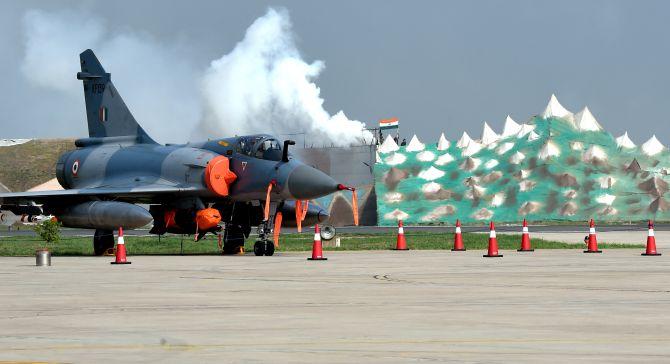'We took the initiative after Balakot and continued to hold it, forcing Pakistan to react.'
'This was not the case in the Kargil conflict.'
'At that time we 'reacted' to Pakistan's actions,' points out Colonel Anil A Athale (retd).

During the Balakot episode, in order to not alarm the world, and to display maturity, Prime Minister Narendra Damodardas Modi de-emphasised the strategic aspects of the airstrike while concentrating on the tactical one of 'getting into the enemy's home and destroying him' rhetoric.
Only on one occasion did the PM let slip a comment on larger aspects when he mentioned that 'Indian nuclear weapons are not Diwali crackers'.
I claim no inside knowledge or information about the Balakot strike decision-making, that must necessarily remain secret for some time. But based on pure military logic, it must be accepted that when India deployed an air strike at Balakot on February 26, 2019, it must have alerted its navy and army and also readied its missiles and nuclear weapons force, should Pakistan decide to escalate.
Some glimpses of this were available from Pakistani sources who claimed that Indian Navy ships and submarines were already near Karachi.
It is to India's credit that Pakistan did not detect these preparations in advance. These moves must have been initiated at least 48 hours in advance.
In a nutshell, India was ready for a pre-emptive nuclear strike and a conventional attack by army, navy and air force, and continued its robust response to the proxy war in Kashmir through Operation All Out.
In short, India showed its domination of the full spectrum of conflict ranging from low intensity, conventional to nuclear war.
It is also widely speculated that India had threatened Pakistan with more strikes on its airfields in case the captured Indian pilot was not returned within 48 hours as per international peace time norms.
It is for the first time since both countries went nuclear that India initiated a confrontation.
We took the initiative and continued to hold it, forcing Pakistan to react.
This was not the case in the Kargil conflict that took place 20 years ago. At that time we 'reacted' to Pakistan's actions.
The Balakot strike episode brought out starkly Pakistan's strategic vulnerability. All its major air bases, missile sites and major strategic targets are within range of India's BrahMos and Prithvi missiles and can be destroyed within minutes.
On the other hand, Indian strategic targets are out of reach for most Pakistani forces, its missiles and aircraft.
The Balakot episode also brought out the cardinal fact that the only viable strategy for Pakistan is to launch a pre-emptive surprise strike against India.
If Indian forces take the initiative or are warned beforehand, then Pakistan does not stand a chance in either conventional or nuclear retaliation.
In strategic parlance, in a game of chicken, Pakistan blinked first!
In the future, if we are to avoid a surprise Pakistani strike, then we have no option but to have a 24x7x365 surveillance of all of Pakistan. With our satellites we are possibly in a position to do that.
To further enhance our ability to always have the upper hand, we need a missile shield for our strategic targets. The purchase of the S-400 Triumph Russian anti-missile system will give us that ability.
While nominally an anti-aircraft and missile system is classified as defensive, its actual effect is offensive in nature. With its 400 km range, these missiles will cover the entire Pakistani air space without crossing the border.
S-400 missiles deployed within India can destroy Pakistani aircraft and missiles even before they have a chance to be launched. It is for this reason that India is resisting US pressure and plans to go ahead with this purchase.
It was in the interest of peace that India did not gloat over the Balakot success, since that would have made the Pakistani government vulnerable to a domestic backlash and forced that nation into a losing conflict.
The Indian government was careful in calling its action as focused only on 'terrorists' and not the Pakistani government or its army. This left an escape route for Pakistan to de-escalate without losing face.
But one is sure: Both the Pakistani government and army have learnt a valuable lesson and realised their strategic vulnerability.
Although it will never openly declare it, it appears that Pakistan has begun to moderate its support to the terrorist groups it harbours.
In a sense, the Balakot incident was like the 1962 Cuban missile crisis between the United States and the Soviet Union. After that near miss, both countries embarked on stable nuclear deterrence.
Once the deterrence was in place, both countries went on to establish political détente.










